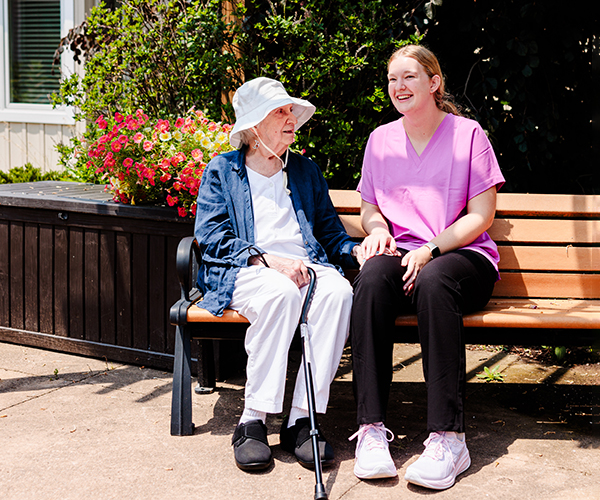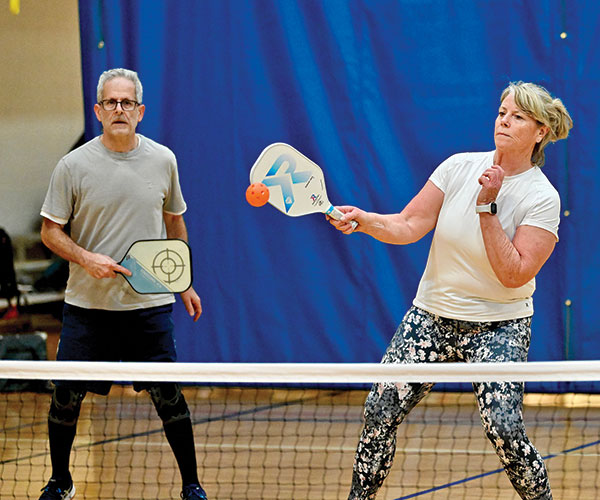Gizmo's an interesting-looking fellow: decidedly overweight with sometimes-unruly hair and a long snakelike tongue. He has a bit of an attitude as well, refusing to move for big heavy carts when, the way he sees it, they could just as easily move for him. He has his own special chair, which is never moved and never sat in by anyone but him — except on occasion by an unknowing stranger who is corrected quickly enough. He's a tiny guy, but he demands a lot of respect.
Another thing about him: Gizmo's got an enormous heart, just like his brother Jacob. It's on display every day at the Menorah Park's Weinberg 2 Pavilion, where the pair of long-haired Chihuahuas "work," where they are included on the employees' birthday list, where they participate in everything from art therapy to high tea.
When Judith Yaeger, a nurse at Weinberg 2, gets up for work at 5:45 a.m., so do they.
"They'd rather sleep late, but when I get up, they'll open one eye," she says. "Then, when I say, ‘C'mon, guys, time for work,' they get up. By the time I leave, they're already in the bag by the door, ready for another day."
They make the trip to Menorah Park, a senior living center in Beachwood, in a specially made dog bag. From the moment Yaeger unzips it, each canine knows exactly what to do. Jacob begins his workday in resident Clarice Englander's bed, snuggling down under the covers until she gets up.
"Clarice is Jacob's best friend," Yaeger says. "He always seeks her out."
Englander lost her left leg two years ago due to poor circulation. The flat empty spot on her wheelchair's leg platform is the perfect place for Jacob to ride. Before Jacob, people who looked at Englander often looked away just as quickly, perhaps feeling sorry for her loss. Now, with a Chihuahua riding around with her, she gets all kinds of attention. People are always saying, "Look at that cute dog riding on her chair."
"I take him everywhere," Englander says, petting Jacob fondly. "He's a lovely friend."
Yes, he is. Jacob and Gizmo are wonderful examples of how animals can help older adults deal with loneliness and depression. When a senior can no longer properly care for a pet of their own, therapy dogs and other animals become even more important.
Take Claire Marsh, for example. Just before she moved into Judson Park's assisted-living facility in University Circle, she came to the painful realization that her Chihuahua, Hannah, demanded too much of her. Marsh couldn't safely navigate walks in the snow and her medical issues often conflicted with the dog's need for attention.
Hannah now lives with family friends, but it was still a very difficult transition for Marsh. Tears spring to her eyes when she thinks about her beloved pet. "I know it might seem silly," she says, "but it's so hard to let her go."
Christine Laraway, the marketing director for the Benjamin Rose facilities in Cleveland and Cleveland Heights, knows that it's not silly at all. "Their cat or their dog is everything to them," Laraway says. "It's very traumatic for them to get rid of a cat or a dog. That's their family, in some cases." Laraway has seen this scenario so often that she's made it a personal mission to find good homes for animals that seniors have to give up.
Marsh's pain was eased by the array of animals at Judson Park. They quickly figured out that Marsh is an animal lover. "A dog knows a dog lover, and they know that about Claire," observes Yvonne Bozeman-Lisaula, a resident assistant at Judson Park.
Bozeman-Lisaula brings her toy poodle, Scorpio, to work with her on Fridays, and she's seen the value of doing so. During a physical therapy session, Bozeman-Lisaula placed Scorpio on the lap of a woman who seemed unresponsive. She smiled and petted Scorpio. After a few minutes, the woman's daughter drew Bozeman-Lisaula aside. "Thank you," Bozeman-Lisaula remembers her saying. "My mother hadn't responded to anything in two months until you put that dog in her lap."
Says Bozeman-Lisaula, "When we left there, I said, ‘Scorpio, you did your job today.' "
Animals such as Scorpio, Gizmo and Jacob are becoming a common sight at long-term care facilities. Many facilities encourage residents to keep their pets as long as possible; when a pet must be given up, there is usually another there to fill the void.
At The Renaissance, an Eliza Jennings facility in Olmsted Township, Maggie the schnauzer still occupies the corner in an activity room, even though her owner has passed away.
"The staff there wanted to keep the animal and the dog was such a big part of the community," says Jim Rogerson, Jennings' executive vice president of operations. "So she has a corner with her bed and toys, and everybody shares responsibility for taking care of her. We do whatever works. We try to make everything as homelike as possible."
Home is a core concept of The Eden Alternative, an approach to care that uses nature to create what originator Dr. William H. Thomas calls "holistic elder care." Animals, children, plants and gardening ward off what Thomas terms the "three plagues" in long-term care facilities that can't be cured medically: loneliness, helplessness and boredom. His antidotes are companionship, spontaneity and the ability to give and receive care.
"The traditional nursing home gives you three meals a day, but no reason to live," Thomas has said. "We must get people hooked on living."
The Eden Alternative philosophy, which Judson adopted five years ago, "goes from independent living all the way to nursing care," explains Lin Bartel, director of the Eden program at Judson. It was the first facility in Northeast Ohio to be accredited and registered with Eden. (There are now others, among them St. Augustine in Lakewood. Laurel Lake in Hudson is in the process of becoming one.) "The results are happier residents, lower staff turnover and more fun. It's not always fun, but that's a part of life — that in itself creates more of the homelike atmosphere."
Under Bartel's desk lies a huge dog pillow and rawhide bone for Bosun, her lab/husky mix, who is a familiar fixture at Judson Park. "Our residents might not always remember the dog's name or the child's name, but they know it's the same ones over and over, and that's very meaningful to them," Bartel says.
Menorah Park offers a nature center complete with a talking macaw, a nearly 4-foot alligator, a rather large salamander, bunnies, birds and an impressive tropical fish tank. People come in to be comforted by the animals' presence.
George Adler, 73, a Menorah Park resident, sees to it that those who can't visit the nature center see the animals anyway. He places Chloe, a small brown pug who belongs to a Menorah Park secretary, in the basket of his motorized cart and drives her around to visit other residents. "People are always waiting for me to come and let them pet the dog," he says. "Animals like her make older persons feel better."
Beth Silver, a public-relations specialist at Menorah Park and an animal lover, is delighted that Adler loves to share Chloe. "Animals give unconditional love, and who doesn't want that?" she says.



